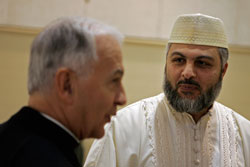Catholics, Muslims gather for annual Midwest dialogue

Bishop Dale J. Melczek of Gary, Ind., and Imam Mongy El Quesny of the Northwest Indiana Islamic Center chat on Oct. 26 at the center in Crown Point during the opening session of the 2008 Midwest Muslim-Catholic Dialogue. This was the first time that the Diocese of Gary hosted the interreligious dialogue. (Photo by Tim Hunt,)
By Steve Euvino (Northwest Indiana Catholic)
CROWN POINT—In a first for the Diocese of Gary, Catholics and Muslims gathered there for the annual Midwest Muslim-Catholic Dialogue on Oct. 26-28.
They met at Catholic and Islamic institutions to engage in interreligious dialogue because, as its mission statement declares, the dialogue “is part of our core identity as people of faith.”
Representatives from several states and the District of Columbia attended a series of scholarly sessions and public sessions dealing with such issues as religious freedom, religion in the public square and immigration as well as an analysis of the American legal structure as it relates to Islamic law.
Joan Crist, director of the Gary diocesan Office of Ecumenism and Interreligious Affairs, said the purpose of the dialogue, started in 1996, is to “create understanding between our two religions.”
Sessions were held at the Northwest Indiana Islamic Center in Crown Point, Calumet College of St. Joseph in Whiting and the Gary Diocese’s pastoral center in Merrillville. The schedule allowed time for the five daily prayers of Islam and for Masses and Catholic prayer services.
Gary Bishop Dale J. Melczek, offering a welcome on Oct. 26 at the Islamic center, said that in the past year leaders from both faiths have made public efforts toward making peace between the two groups.
Noting that Christians and Muslims comprise 55 percent of the world’s population, the bishop quoted from a Muslim letter that stated: “If Muslims and Christians are not at peace, the world cannot be at peace.”
Quoting from the Quran, the sacred book of Islam, the bishop noted that, “Without giving the neighbor what we ourselves love, we do not truly love God or the neighbor.” He likened that to the Apostle James, who wrote: “My brothers, what good is it to profess faith without practicing it?” (Jas 2:14).
The bishop also quoted from Catholic bishops in Africa who said that although Catholics and Muslims hold some similar fundamental religious values—the need for prayer, the uniqueness of God, and the importance of almsgiving, fasting and pilgrimages—bigotry, intolerance, militarism and fundamentalism by a tiny minority are the main sources of conflict.
While these bishops acknowledged these challenges, Bishop Melczek said, “they urged that we place the difficulties in the hands of God and move forward with a spirit of hope.”
In his welcome, Imam Mongy el Quesny, the Islamic center’s spiritual leader, listed some of the religious figures that both faiths hold in common, including Noah, Moses, Jacob, Joseph, Benjamin, Aaron and John the Baptist.
“Let us come together for a common word,” the imam said, and that word is “justice.”
He added that both Christians and Muslims have lived in this country for a long time, but he said it was not until he spent some time in New York that he experienced tension between the two groups. He prayed that the dialogue would help the two groups “bring all the issues that can bring us together.”
He also prayed that God would give the dialogue participants knowledge and compassion to “lead to a straight path to God ... and forgive any mistakes we made in this life.”
Msgr. Patrick Halfpenny of the Detroit Archdiocese, who is archdiocesan ecumenical and interfaith adviser, said the challenge of dialogue sessions is to see “how our dialogue advances the mission of peace” and how these sessions can bear fruit—“fruit that will last.”
Muslims in the U.S. can learn from the history of American Catholics, said Sayyid M. Syeed, the
Washington-based national director of the Office for Interfaith and Community Alliances of the Islamic Society of North America.
Catholics who immigrated to America faced hardships, but in time they became accepted and now are recognized for their schools and hospitals.
Just as Catholics have contributed to American society, said Syeed, so too do Muslims, not through isolation, “but by building bridges of understanding.”
(Go to the website of the Northwest Indiana Catholic) †
